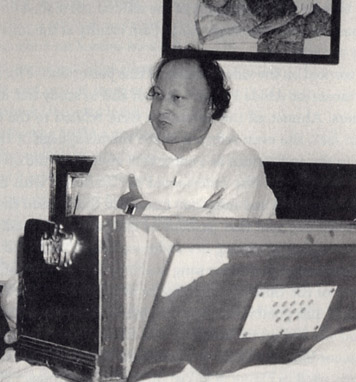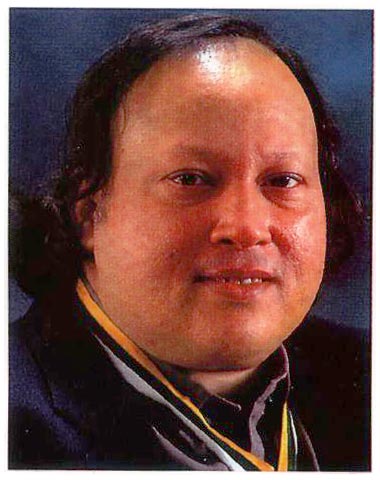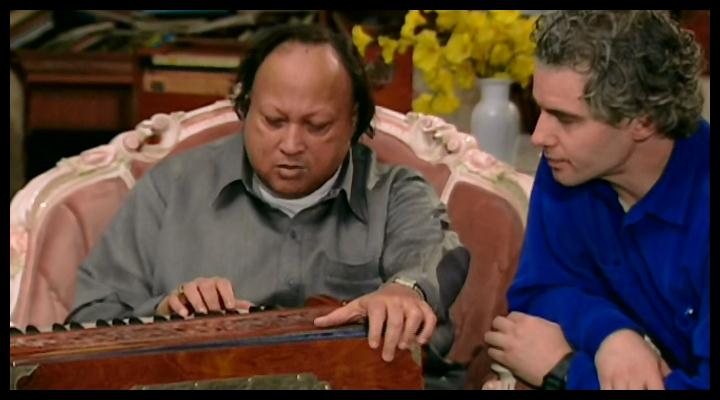Nursat fateh ali khan was born on 13 October 1948. His birth name was Pervez fateh ali khan. He was born in Faisalabad Pakistan. Nursat fateh ali khan was the fifth child and first son of fateh ali khan, a musicologist, instrumentalist, vocalist and qawali. Khan's family, which included four older sisters and a younger brother, Farrukh Fateh Ali Khan, grew up in central Faisalabad. Initially, his father did not want Khan to follow the family's vocation. He had his heart set on Khan choosing a much more respectable career path and becoming a doctor, because he felt Qawwali artists had low social status.
Khan's training with his father was cut when his father died in 1964, leaving khan's paternal uncles, Mubarak ali khan and Salamat ali khan, to complete his tranining. His first performance was at a traditional graveside ceremony for his father, known as chehlum, which took place forty days after his father's death.
In 1971, after the death of Mubarak ali khan became the official leader of the family Qawwali party and party become know as Nursat Fateh Ali Khan, Mujahid Mubarak Ali khan party.
Khan's first public performance as the leader of the Qawwali party was at a studio recording broadcast as part of an annual music festival organised by Radio Pakistan, known as Jashn-e-Baharan. Khan sang mainly in Urdu and Punjabi and occasionally in Persian, Braj Bhasha and Hindi. His first major hit in Pakistan was the song Haq Ali Ali, which was performed in a traditional style and with traditional instrumentation. The song featured restrained use of Khan's sargam improvisations.
Khan's first public performance as the leader of the Qawwali party was at a studio recording broadcast as part of an annual music festival organised by Radio Pakistan, known as Jashn-e-Baharan. Khan sang mainly in Urdu and Punjabi and occasionally in Persian, Braj Bhasha and Hindi. His first major hit in Pakistan was the song Haq Ali Ali, which was performed in a traditional style and with traditional instrumentation. The song featured restrained use of Khan's sargam improvisations.
In 1979, Khan married his first cousin, Naheed the daughter of Fateh Ali Khan's brother, Salamat Ali Khan.
Early in his career, Khan was signed up by Oriental Star Agencies in the U.K. to their Star Cassette Label. OSA sponsored regular concert tours by Khan to the U.K. from the early '80s onwards, and released much of this live material on cassette, CD, videotape and DVD.
In the summer of 1985, Khan performed at the World of Music, Arts and Dance festival in London. He performed in Paris in 1985 and 1988. He first visited Japan in 1987, at the invitation of the Japan Foundation. He also performed at the 5th Asian Traditional Performing Art Festival in Japan.
Khan contributed the song "Gurus of Peace" to the album Vande Mataram, composed by A. R. Rahman, and released to celebrate the 50th anniversary of India's independence. Rahman, who was a big fan of Khan could not do further songs with him. As a tribute, Rahman later released an album titled Gurus of Peace, which featured "Allah Hoo" by Khan. Rahman's 2007 song "Tere Bina" was also done as a tribute to Khan.
Khan was taken ill with kidney and liver failure on 11 August 1997 in London, England, while on the way to Los Angeles USA in order to receive a kidney transplant. He died of a sudden cardiac arrest at Cromwell Hospital, London, on Saturday, 16 August 1997, aged 48. His body was repatriated to Faisalabad, Pakistan, and his funeral was a public affair.
The composition of Khan's ensemble, called a "party" (or "Humnawa" in Urdu), changed over its 26 years. Listed below is a snapshot of the party, circa 1983:
Composition Nursat Qawali party
Mujahid Mubarak Ali Khan: Khan's first cousin, vocals
Farrukh Fateh Ali Khan: Khan's brother, vocals and lead harmonium
Rehmat Ali: vocals and second harmonium
Maqsood Hussain: vocals
Rahat Nusrat Fateh Ali Khan: Khan's nephew and pupil, vocals
Dildar Hussain: percussion
Majawar Abbas: mandolin and guitar/chorus, handclapping
Mohammed Iqbal Naqvi: secretary of the party, chorus, handclapping
Asad Ali: chorus, handclapping. Khan's cousin
Ghulam Farid: chorus, handclapping
Kaukab Ali: chorus, handclapping
Awards and titles
Khan is widely considered to be the most important qawwal in history. In 1987, Khan received the President of Pakistan’s Award for Pride of Performance for his contribution to Pakistani music. In 1995 he received the UNESCO Music Prize. In 1996 he was awarded Grand Prix eds Amériques at Montreal World Film Festival for exceptional contribution to the art of cinema. In the same year, Khan received the Arts and Culture Prize of the Fukuoka Asian Culture Prizes.
In 2005, Khan received the "Legends" award at the UK Asian Music Awards. Time magazine's issue of 6 November 2006, "60 Years of Asian Heroes", lists him as one of the top 12 artists and thinkers in the last 60 years. He also appeared on NPR's 50 Great Voices list in 2010. In August 2010 he was included in CNN's list of the twenty most iconic musicians from the past fifty years.
Documentaries
Nusrat Fateh Ali Khan: le dernier prophète 1996. Directed by Jérôme de Missolz.
Nusrat has Left the Building But When? 1997. Directed by Farjad Nabi.
A Voice from Heaven 1999. Directed by Giuseppe Asaro. New York, NY: Winstar TV & Video. This 75-minute documentary, available on VHS and DVD, provides an introduction to Khan's life and work.
Samandar Main Samandar 2007. A documentary aired on Geo TV detailing Khan's career.
The King of Qawalli 2009. A short film aired on Dawn News about Khan's life and career.
Discography
1988: In Concert in Paris, Vol 1. Ocora.
1988: Shahen-Shah. RealWorld/CEMA.
1990: Mustt Mustt. RealWorld/CEMA. Collaboration with Michael Brook.
1991: Magic Touch OSA.
1991: Shahbaaz. RealWorld/CEMA.
1991: The Day, The Night, The Dawn, The Dusk. Shanachie Records.
1992: Devotional Songs. Real World Records.
1992: Love Songs. EMI.
1993: Ilham. Audiorec.
1993: Traditional Sufi Qawwalis: Live in London, Vol. 2. Navras Records.
1994: Pakistan: Vocal Art of the Sufis, Vol 2 – Qawwali. JVC.
1994: Nusrat Fateh Ali Khan & Party. Real World Records.
1994: The Last Prophet. Real World Records.
1994: Traditional Sufi Qawwalis: Live in London, Vol. 4. Navras Records.
1995: Revelation. Interra/Intersound.
1995: Back to Qawwali. Long Distance
1996: In Concert in Paris, Vol. 3–5. Ocora.
1996: Qawwali: The Art of the Sufis. JVC
1996: Night Song. Real World Records.
1996: Dead Man Walking: The Score. Columbia/Sony
1996: Intoxicated Spirit. Shanachie Records.
1996: Mega Star. Interra.
1996: Bandit Queen. Milan.
1996: The Prophet Speaks. M.I.L. Multimedia.
1996: Sangam. EMI.
1997: Live In India. RPG.
1997: Akhian. M.I.L. Multimedia.
1997: Live in New York City. M.I.L. Multimedia.
1997: Farewell Song: Alwadah. M.I.L. Multimedia.
1997: In Concert in Paris, Vol 2. Ocora.
1997: Oriente/Occidente: Gregorian Chant & Qawwali Music. Materiali Sonori.
1998: Allah & The Prophet. Ex Works.
1998: Star Rise: Remixes. EMI.
1998: Live at Royal Albert Hall. M.I.L. Multimedia.
1998: Missives from Allah. BCD.
1998: Imprint: In Concert. Hi Horse Records. Selections from the 23 January 1993 concert at Meany Hall, University of Washington in Seattle, during Khan's residency at their ethnomusicology program.
1999: Peace. Omni Parc.
1999: Live at Islamabad, Vol 1–2. M.I.L. Multimedia.
1999: Passion. NYC Music.
1999: Visions of Allah. Ex Works.
1999: Swan Song. Narada.
2000: Jewel. MoviePlay.
2000: Live in London, Vol 3. Navras Records.
2001: Opus. Vanstory.
2001: The Final Studio Recordings. Legacy/Sony.
2001: Pukaar: The Echo. Navras Records.
2001: The Final Moment. Birdman Records.
2002: Body and Soul. RealWorld/CEMA.
2002: Sufi Qawwalis. Arc Music.
2004: Allah Hoo. Saregama.
2004: Aur Pyar Ho Gaya. Saregama.
2004: Ishq Da Rutba. Saregama.
2004: Kartoos. Saregama.
2004: Main Aur Meri Awargi. Saregama.
2004: Ye Jo Halka. Saregama.
2005: Nami Danam. JVC Compact Discs.












No comments:
Post a Comment
Note: only a member of this blog may post a comment.